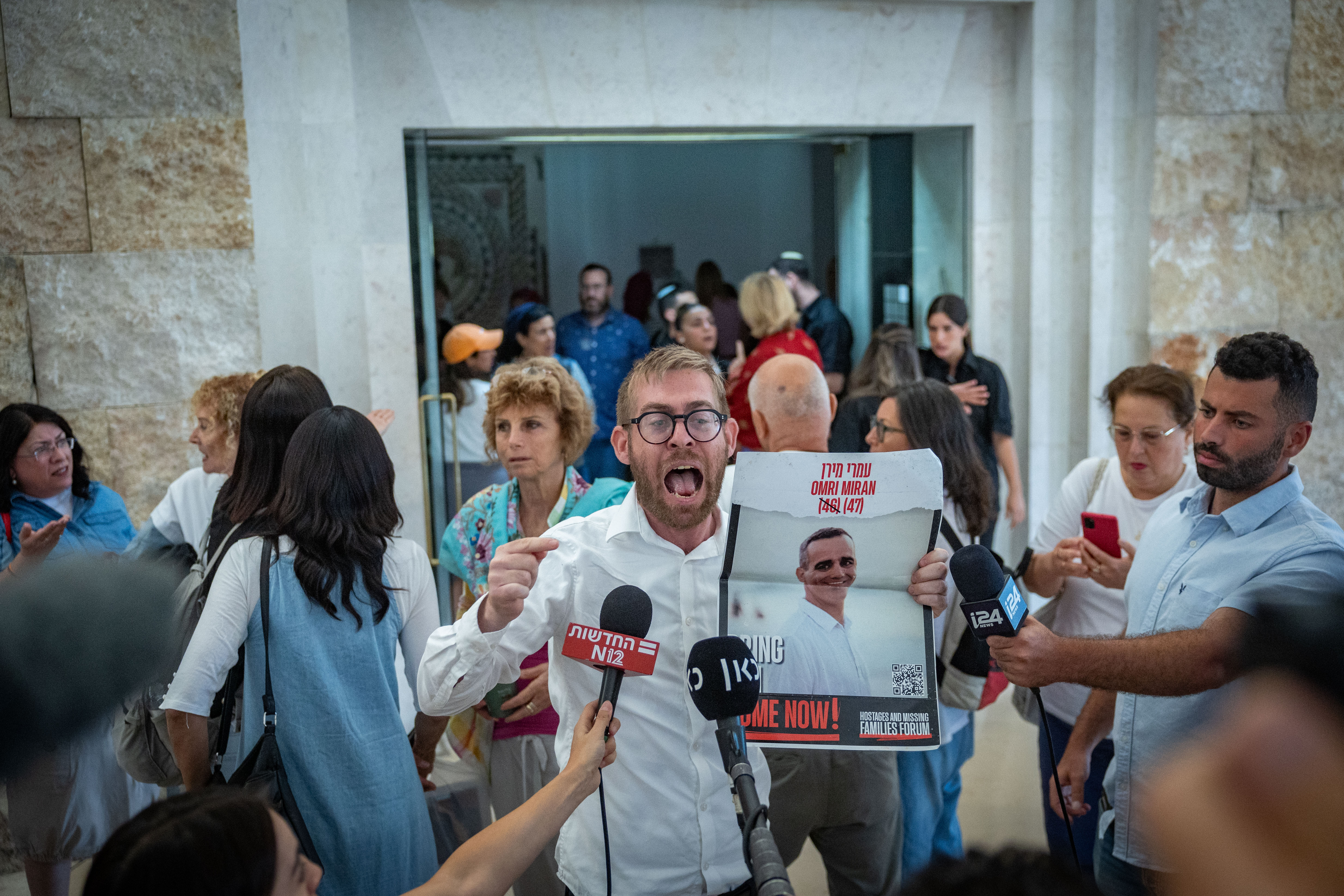Even Against Terrorists – The Rule of Law Prevails
The rule of law is a fundamental democratic principle, meaning that all governing bodies are subject to and must comply with the law. Despite the complexities inherent in ongoing war, this is true also of the IDF, and only decisive action against breaches of conduct may protect the rule of law in Israel and Jewish morality.

Bereaved families and supporters protest against a court hearing in petition against the conditions of Hamas terrorists in the Sde Teiman Military Base. Photo by Yonatan Sindel/Flash90
"The strength of a society to stand against its enemies is based on its recognition that it fights for values worthy of protection. The rule of law is one of these values." In these simple words, written in a court ruling from 35 years ago, one can summarize the story that recently shook Israeli society.
The very existence of a judicial process against soldiers suspected of torturing detainees from the Nukhba terrorist group in Israel is one of the most important things happening in the IDF right now. It seems that now, after nine months of fighting, the urgent matter at hand is the reminder that what distinguishes us from Hamas is the obligation to obey the law and treat even detained terrorists according to the law. We must remind ourselves that the IDF is a professional army whose soldiers cannot act as if they were in militias where each one does as he or she sees fit. It is essential, even in the most challenging moments and even in the face of pure evil, to uphold the values of the IDF.
Unlike terrorists or militias, a professional army has disciplinary and judicial procedures. The judicial process is a constant reminder of the limits of the power of the military and its soldiers.
The rule of law, beyond being a fundamental democratic principle, is also a central social value in the identity of Israeli society. The shared starting point for all of us is that all governing bodies, professional and elected officials, civilians, and public employees, including soldiers, are subject to and comply with the law. This is especially true given that Israel's is a "people's army." The fact that most of the nation is required to serve it in compulsory and reserve service ties the military deeply to the Israeli public, a connection that does not exist in militaries based on voluntary service. The rule of law is a fundamental value upon which the trust of Israeli society in the IDF, the police, and other security forces is built. It is the basis for the legitimacy granted to Israel in the international arena, even if this legitimacy, unfortunately, is waning.
The ethos that the IDF is the "most moral army in the world" began with the heritage story of Major Hanan Samson, who was killed in an incident where he refrained from shooting at a woman and baby that a terrorist used as a human shield, and thus met his death.
Researchers have often warned that military service under the shadow of recurring combat operations might lead to a decline in the internal commitment of IDF soldiers and the entire military campaign to the IDF's moral code. The fear was that being in the field under unpredictable, complex, and prolonged conditions would lead to a decline in soldiers' perception of the sanctity of human life and the importance of the rule of law, including when prosecuting captured enemy forces. It turns out that this warning proved correct not outside the state's borders, under unpredictable, complex, and harsh conditions in the field in Gaza. Here, right within the walls of a military detention center, IDF soldiers are suspected of taking the law into their own hands and torturing a detainee contrary to the law. This is precisely the judicial system’s role – to ascertain the truth.
After the deaths of Alon, Yotam and Samer, the Israeli hostages mistakenly shot by the IDF earlier in the war, IDF Chief of Staff Herzi Halevi referred to that moral code characteristic of the IDF. He said, "For anyone confused here, even those fighting against us and now laying down their weapons and raising their hands, we capture them; we do not shoot them. [...] We do not shoot them because the IDF does not shoot a person who raises his hands. That is strength, not weakness."
Perhaps this prolonged war has disrupted some of the humanity in our moral compass. Maybe the Chief of Staff's words were heard but not truly absorbed. The suspicions of torture and rape of a Nukhba terrorist – if they indeed occurred – are not just taking the law into one's hands but primarily a moral and ethical stain on the IDF. Only decisive action against these phenomena may somewhat slow the deterioration of the rule of law in Israel and Jewish morality.
This article was published in the Jerusalem Post.
- Tags:
- Governance,
- Human Rights,
- International Law,
- Rule of Law,
- Security and Democracy,
- Israel At War,
- Politicizing Security Agencies,
- Democracy in Defense,
- ethics,
- human rights and Judaism,
- IDF,
- political violence,
- Rule of Law,
- Democratic Values and Institutions Program,
- Center for Democratic Values and Institutions,
- Center for Security and Democracy
